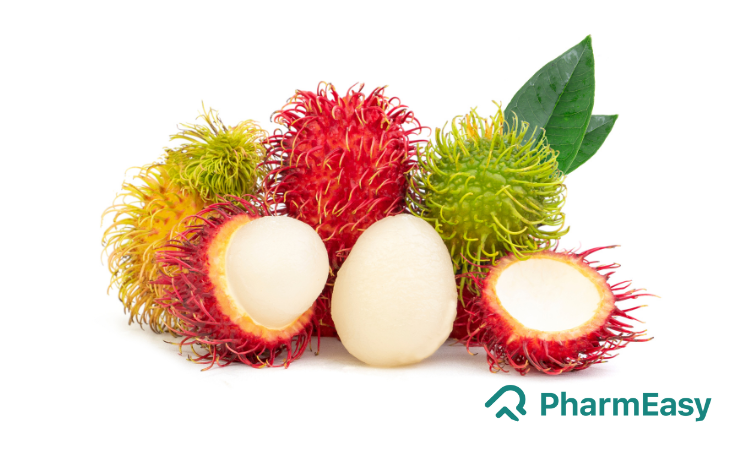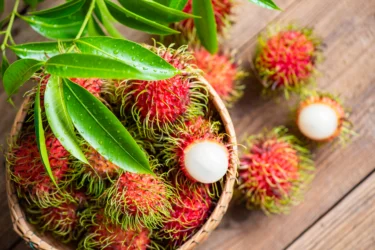Rambutan: Uses, Benefits, Side Effects, and More By Dr. Smita Barode
By Dr Smita Barode +2 more

Get,

to manage your symptom
Get your,


4 Cr+ families
benefitted

OTP sent to 9988776655



You’ve successfully subscribed to receive
doctor-approved tips on
Whatsapp

Get ready to feel your best.

Hi There,
Download the PharmEasy App now!!


Register to Avail the Offer
Send OTPBy continuing, you agree with our Privacy Policy and Terms and Conditions

Hi There,
Sign up on PharmEasy now!!
Trusted by 4 crore+ families

OTP sent to 9988776655



You have unlocked 25% off on medicines




Code: NU25
By Dr Smita Barode +2 more
Table of Contents
Rambutan is a fascinating looking red spiky fruit with soft thorns in red, yellow, and green shades. It is also known as a hairy fruit. It is a tropical, ovoid shaped fruit with a red or yellow fruit wall. The Rambutan tree is originally from Malaysia, and its name is derived from the Malay word ‘rambut’ which means hair. Rambutan is popularly grown in India, Malaysia, Indonesia, Thailand, and some humid parts of the United States. The scientific name of rambutan is Nephelium lappaceum, and it belongs to the family Sapindaceae. Rambutan pulp, seeds and peel have several bioactive compounds that may benefit food, pharmaceuticals, medicine, and cosmetics advances1. Let us glance through some of the benefits of eating rambutan and experience the unique rambutan taste, characterized by its sweet and juicy profile with hints of floral notes.

Rambutan seeds, peel and pulp may contain several bioactive compounds like polyphenols, including ellagitannins, geraniin, corilagin, and ellagic acid. It may contain fatty acids like arachidonic acid, stearic acid, palmitic acid and many more1. Furthermore, Rambutan fruit may contain the following nutrients:
Did you know?
Several studies have shown that rambutan may have the following properties:
Rambutan seeds are roasted and eaten as snacks in the Philippines. Munching on these seeds as a morning or evening snack not only satisfies your taste buds but also offers rambutan benefits for health and well-being14.
Dr. Siddharth Gupta, B.A.M.S, M.D (Ayu)
Some of the potential rambutan benefits are:

A study3 by Hernàndez et al. in 2017 showed that rambutan might be an antioxidant. The antioxidant potential of rambutan may be due to phytochemical compounds like phenols, flavonoids, corilagin, geraniin, and ellagic acid. These compounds may deactivate the free radicals (harmful molecules present in the body) and protect the body from various damages.

A study by Perumal et al. in 2020 showed that rambutan might act against breast, bone, cervical and liver cancer. The anticancer activity of rambutan may be due to bioactive compounds like flavonoids, alkaloids, tannins, terpenoids and other phenolic compounds like geraniin. Rambutan benefits may show apoptosis (kill the cancer cells) and inhibit their growth. However more studies are required to check if rambutan can be used against cancer. Cancer is a serious disease therefore, you must consult your doctor if you suspect cancer instead of self-medicating.

Rambutan is a delicious tropical fruit that might offer potential benefits for diabetes management. A study by Muhtadi et al. in 2016, conducted on rats, suggested that bioactive compounds found in rambutan, such as catechin, quercetin, polyphenols, geraniin, and tannins, could contribute to reducing blood sugar levels. These compounds may help inhibit glucose absorption by the cells and stimulate insulin secretion, potentially assisting in the maintenance of normal blood sugar levels. It’s important to note that this study was conducted on animals, and further research on humans is needed to confirm the potential rambutan benefits for diabetes. If you have diabetes it’s essential to monitor your blood sugar levels regularly and consult with your healthcare provider for appropriate guidance.

A study6 by Ahmad et al. in 2015 showed that geraniin in rambutan might have anti-viral activity and act against DENV-2 (dengue virus type-2). Geraniin may inhibit the attachment of the dengue virus to the body cells and may also interfere with a viral protein (E protein) to disrupt the infection process. However, further studies are required to check if rambutan may act against the dengue virus. Therefore you must immediately consult your doctor if you suspect any symptoms of dengue.

A study7 by Chingsuwanrote et al. in 2015 showed that the polyphenols in rambutan might reduce inflammation. The polyphenols may inhibit the secretion of TNFα, an inflammatory cytokine (molecules in the body responsible for inflammation). However, more studies are required to check if rambutan has anti-inflammatory properties.

A study8 by Phuong et al. in 2020 showed that bioactive compounds in rambutan, like tannins, corilagin, geraniins, and ellagic acid, may possess antibacterial activity. Various bioactive compounds have different ways of showing their antibacterial activity. Tannins may change the structure of the cell wall and cell membrane. Ellagic acid may attach to the cell wall and destabilize it. Corilagin may inhibit the growth of bacteria by disrupting cell permeability. However, more large scale studies are required to check the antibacterial effect of rambutan. Therefore you must consult your doctor if you suspect a microbial infection.

A study9 by Fang et al in 2018 suggested that rambutan fruit benefits might extend to lowering blood pressure. Specifically, geraniin found in rambutan may play a role in reducing blood pressure by decreasing the release of noradrenaline (a hormone that increases blood pressure) and relaxing tension in the blood vessels. Further research involving human subjects is needed to confirm these effects. It’s essential to consult your doctor if you have abnormal blood pressure instead of attempting self-medication.
Though studies show the benefits of rambutan in various conditions, these are insufficient, and there is a need for further studies to establish the true extent of the benefits of rambutan on human health.
Researchers are evaluating the anti-HIV, anti-dengue and anti-allergic properties of Rambutan. These activities have been observed during lab trials more research is needed to support these claims14.
Dr. Rajeev Singh, BAMS
Rambutan can be consumed in the following way:
You must consult a qualified doctor before taking large quantities of Rambutan or other herbal supplements. Likewise, do not discontinue or replace an ongoing treatment of modern medicine with an ayurvedic/herbal preparation without consulting a qualified doctor.
Rambutan side effects are reported as follows:
If you notice any reaction by consuming rambutan, seek immediate medical attention. First, consult your ayurvedic physician who has prescribed it to you; they will be able to identify the cause and treat it.
The following precautions can be taken before consuming rambutan:
It is advised to consult your doctor before consuming if you have any pre-existing diseases.
There is not enough evidence on the interaction of rambutan with other drugs. Further studies on the interaction of rambutan are required. Therefore you must consult your doctor if you are on any other medication before consuming rambutan.
Also Read: Nirgundi: Benefits, Uses, Side Effects & More!
Rambutan may cause nausea and vomiting, angioedema (swelling of the lower layer of skin), urticaria (swollen, reddened, and itchy skin), flushing of the skin (sudden redness of the skin), chest tightness, and wheezing11.
Bioactive compounds in rambutan, like catechin, quercetin, polyphenols, geraniin, and tannins, may help to reduce blood sugar5. However, you must check your blood sugar levels regularly and consult your doctor in case of abnormal blood sugar levels
Rambutan is considered safe, but pregnant and breastfeeding mothers shall take precautions before consuming rambutan12. Saponins and tannins are phytochemicals, and they are biologically active compounds. But in a few cases, saponins and tannins may be toxic to a few people. In addition, rambutan seeds may be narcotic (causes sleepiness and affects mood)13. It is advised to consult your doctor if you have any pre-existing diseases before consuming.
Rambutan seeds are generally not recommended for consumption as they can be bitter and potentially toxic. It’s advisable to consult with a healthcare professional for personalized guidance regarding your dietary choices and potential risks associated with consuming rambutan seeds.
While rambutan consumption is not commonly associated with sore throat, individual reactions may vary. If you experience a sore throat after consuming rambutan or suspect any adverse reactions, it’s advisable to consult with a healthcare professional for a personalized assessment and guidance.
Consuming rambutan is generally safe for most individuals. However, if you experience digestive discomfort, allergies, or any adverse reactions after consuming rambutan, it’s advisable to consult with a healthcare professional for a proper assessment and personalized guidance to determine the cause of the illness.
Rambutan is not a known food source that significantly increases uric acid levels. However, individual reactions can vary, and those with gout or uric acid concerns should consume it in moderation and monitor their own body’s response. If you have specific health concerns, consulting a healthcare professional is advisable for personalized guidance.
Rambutan should be avoided for dogs as it can pose a choking hazard due to its large seed and may not provide significant nutritional benefits for them. It’s best to consult with a veterinarian for guidance on safe and appropriate treats for your pet.
Rambutan is typically safe to eat, but for some individuals, overconsumption or sensitivity to certain compounds in the fruit might lead to stomach discomfort or pain. If you experience stomach pain after consuming rambutan, consult a healthcare professional to rule out any allergies or sensitivities and to ensure it aligns with your dietary choices.
While rambutan is generally not associated with causing constipation, excessive consumption or dietary factors could potentially lead to this issue in some individuals. If you encounter constipation after eating rambutan, consult a healthcare professional to assess your dietary choices and address any underlying causes.
Rambutan is not commonly linked to causing acne. However, an individual’s skin reactions can vary, and it’s possible that consuming rambutan, especially in excessive amounts, might lead to skin issues for some people. Consulting a healthcare professional or dermatologist can help identify any specific triggers and address potential skin concerns.
Rambutan is not a known cause of cough. Coughing can result from various factors such as infections, allergies, or irritants. If you experience persistent coughing after consuming rambutan, consult a healthcare professional to rule out any allergies or underlying respiratory issues.
There is no scientific evidence to suggest that rambutan can cause a miscarriage. However, during pregnancy, it’s crucial to be cautious about your dietary choices and consult a healthcare professional for guidance on safe and healthy eating practices to support a healthy pregnancy.
Rambutan consumption is generally safe, but excessive intake may lead to diarrhea in some individuals due to its natural sugars and dietary fiber. If you experience persistent or severe diarrhea after eating rambutan, consult a healthcare professional to assess any underlying issues and ensure proper hydration and dietary choices.
To eat rambutan, start by making a shallow cut around the circumference of the fruit’s skin, being careful not to cut too deep. Then, gently twist the fruit open, revealing the juicy flesh inside. Remove the seed and enjoy the sweet and slightly tangy fruit.
No, rambutan is not a tree nut. It is a tropical fruit belonging to the Sapindaceae family and is botanically related to lychee and longan. While it may trigger allergies in some individuals, it is not classified as a tree nut allergen.
Disclaimer: The information provided here is for educational/awareness purposes only and is not intended to be a substitute for medical treatment by a healthcare professional and should not be relied upon to diagnose or treat any medical condition. The reader should consult a registered medical practitioner to determine the appropriateness of the information and before consuming any medication. PharmEasy does not provide any guarantee or warranty (express or implied) regarding the accuracy, adequacy, completeness, legality, reliability or usefulness of the information; and disclaims any liability arising thereof.
Links and product recommendations in the information provided here are advertisements of third-party products available on the website. PharmEasy does not make any representation on the accuracy or suitability of such products/services. Advertisements do not influence the editorial decisions or content. The information in this blog is subject to change without notice. The authors and administrators reserve the right to modify, add, or remove content without notification. It is your responsibility to review this disclaimer regularly for any changes.
Comments

Leave your comment...
You may also like
Comments